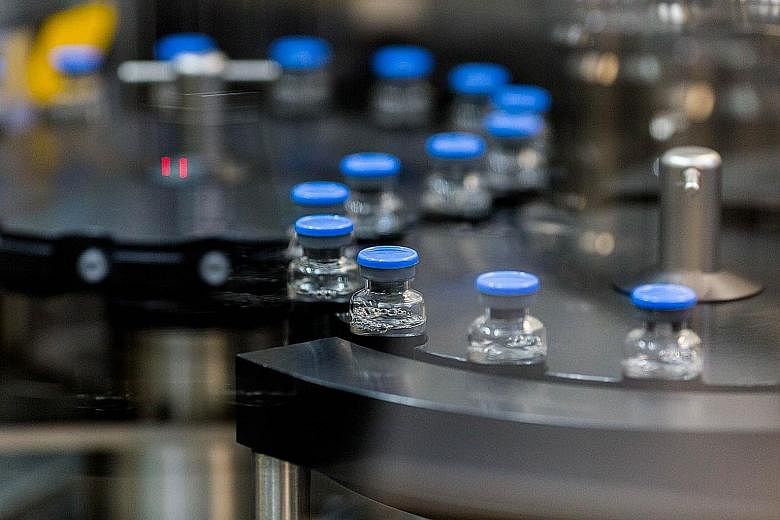As scientists worldwide race to develop vaccines and drugs to prevent and treat Covid-19, some members of the public have resorted to remedies they see on social media which have no basis in science.
Accidental injuries have been reported in some countries, where people consumed methanol or snorted disinfectants in the belief that this could prevent infection.
There is an urgent need to develop effective and safe drugs against this virus which has wrought havoc around the world.
Several existing drugs are now being repurposed and investigated for their antiviral effects.
Doing so significantly shortens the notoriously prolonged drug development process.
A number of drugs have recently been authorised by health regulatory agencies for the emergency or compassionate treatment of severely ill Covid-19 patients.
REMDESIVIR
Remdesivir was initially developed for the treatment of Ebola haemorrhagic fever, with trials still ongoing.
As remdesivir inhibits viral replication, it has been repurposed for the treatment of Covid-19. The United States Food and Drug Administration (FDA) recently issued an emergency use authorisation while the Health Sciences Authority (HSA) of Singapore announced on Wednesday the conditional approval of remdesivir for treating adult Covid-19 patients with severe respiratory conditions.
This application was expeditiously evaluated and approved within a short span of less than three weeks by HSA.
In teaching an old drug to treat a new disease, unprecedented opportunities arise for scientists, governments, healthcare experts, pharmaceutical companies, regulatory agencies and the World Health Organisation to collaborate in the fight against a common yet invisible enemy.
Such extraordinary partnerships will certainly strengthen international collaboration during and post-Covid-19 to achieve enhanced healthcare.
But repurposing drugs in this manner comes with challenges.
CHLOROQUINE AND HYDROXYCHLOROQUINE
Chloroquine and hydroxychloroquine were approved in the 1940s and 1950s for the treatment of malaria and autoimmune diseases respectively. These two drugs have been favoured by some for the treatment of Covid-19 following positive preliminary clinical data and social media hype.
Off-label use of these drugs in some countries has resulted in accidental poisoning due to over-dosing. In addition, there have also been supply shortages, affecting patients suffering from malaria and autoimmune diseases and, ironically, derailing Covid-19 clinical trials as some patients insisted on being treated with chloroquine and hydroxychloroquine instead of the drug being tested.
Some repurposed drugs are not effective for the treatment of Covid-19 at present. In the late 1960s, chloroquine and hydroxychloroquine were shown to inhibit the growth of various viruses including the Sars coronavirus in cell culture.
They act by preventing the virus from entering the host cell, similar to how a lock is changed to prevent access by a burglar.
Despite recent efforts to repurpose these drugs for treating Covid-19, they have not been proven effective against various viruses in both animals and humans over several decades.
These two drugs are considered safe as their adverse effects are mild and reversible.
However, the margin between an effective and a toxic dose is narrow, and chloroquine poisoning has been associated with heart disorders that can be life-threatening.
LOPINAVIR/RITONAVIR
Lopinavir/ritonavir is a drug combination approved by the FDA in the 2000s for the treatment of human immunodeficiency virus or HIV infection.
Lopinavir inhibits an enzyme called protease to reduce viral replication, while ritonavir is added as a "booster" to increase the level of lopinavir in the body.
While clinical trials of lopinavir/ritonavir are still ongoing, early results have yet to demonstrate its clinical effectiveness against Covid-19. This drug combination is generally safe, although it causes liver injury in some.
There are currently clinical trials and preclinical studies investigating the combination of several repurposed drugs for the treatment of Covid-19.
The scientific rationale is to block all the machinery needed for the growth of the virus. Such seemingly attractive synergistic effects can be deemed clinically viable only if there are no enhanced toxicities.
The father of toxicology, 16th-century Swiss physician and alchemist Paracelsus, famously pointed out: "All things are poisons, for there is nothing without poisonous qualities. It is only the dose which makes a thing poison."
Adding to this, two things may not be poisonous when given alone but may become poisonous when co-administered.
Severely ill Covid-19 patients who are prescribed repurposed drugs might indeed benefit from the treatment, but until the results of large-scale randomised clinical trials are reviewed, they must be monitored carefully for potential adverse effects, especially if these drugs are tested in combination.
Even with the approval of remdesivir by HSA, it comes with conditions whereby the drug company is required to monitor its clinical safety, while data from the ongoing clinical trials has to be submitted post-approval to ensure that the drug is both efficacious and safe for long-term use.
It is clear that repurposing drugs for the treatment of Covid-19 has its strengths and challenges.
Let us hope that our world leaders cooperate actively to find remedies for the prevention and treatment of Covid-19. And every one of us must avoid self-medication based on non-scientific misinformation.
About the writer

Professor Eric Chan is a pharmaceutical scientist in the Department of Pharmacy, Faculty of Science, National University of Singapore. He is the chair of the Department Graduate Committee and a registered pharmacist under the Ministry of Health.











